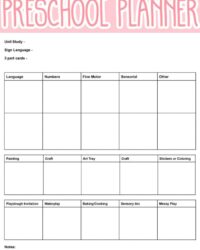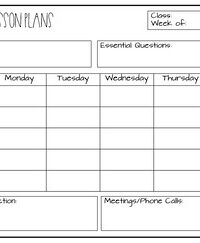Planning for a preschool classroom can feel like juggling colorful balls – each one representing a different activity, a unique learning goal, or a specific child’s needs. It’s a wonderful challenge, full of creativity and passion, but it can also be incredibly time-consuming to organize all those brilliant ideas into a coherent, daily or weekly flow. We all want to provide the best, most engaging experiences for our little learners, ensuring every moment is purposeful and playful.
That’s where a well-designed lesson plan template becomes your best friend. Imagine having a clear framework that guides you through the planning process, prompting you to consider all the essential elements without stifling your unique teaching style. It frees up mental energy, transforming what might feel like a daunting task into an enjoyable part of your routine. With the right template, you can ensure a balanced curriculum, track progress, and easily communicate your educational goals to parents and colleagues.
Unlocking the Potential: What a Robust Template Offers
A comprehensive lesson plan template isn’t just about filling in blanks; it’s a strategic tool that elevates your teaching. It provides a structured approach to curriculum development, helping you break down broad learning objectives into manageable, engaging activities suitable for young children. By having dedicated sections for various aspects of your planning, you ensure no crucial detail is overlooked, from the big picture themes to the tiniest details of your morning circle time.
One of the core strengths of a good template lies in its ability to prompt thoughtful consideration of developmental domains. Preschool education isn’t just about ABCs and 123s; it’s holistic. A template encourages you to integrate activities that foster growth across all areas. This holistic approach is vital for ensuring children develop in a balanced way, addressing not just cognitive skills but also their social-emotional well-being, physical coordination, and creative expression.
Key Developmental Domains to Consider
- Social-Emotional Development: How children interact, express feelings, and build relationships.
- Cognitive Development: Problem-solving, memory, critical thinking, and early literacy/numeracy.
- Physical Development: Fine motor skills (drawing, cutting) and gross motor skills (running, jumping).
- Language and Communication: Speaking, listening, understanding, and expressing ideas.
- Creative Arts: Encouraging imagination through music, art, dramatic play, and movement.
Beyond developmental areas, a useful template will also guide you in outlining the specific activities for each day or week, detailing the materials needed, and considering how you will assess understanding or engagement. This foresight not only makes your teaching smoother but also ensures you have everything prepared in advance, minimizing last-minute scrambles. It encourages a proactive rather than reactive approach to classroom management and learning facilitation.
Moreover, a quality lesson plan template can serve as a historical record of your curriculum, allowing you to reflect on what worked well, what might need tweaking, and how children responded to different learning experiences. This continuous cycle of planning, implementing, and reflecting is fundamental to professional growth and ensuring that your educational offerings are always evolving and improving to meet the unique needs of each cohort of children.
Making Your Preschool Lesson Plan Template Truly Shine
While a template provides structure, its true power comes from how you personalize and adapt it to your specific classroom and the children within it. Think of it as a flexible framework rather than a rigid instruction manual. The best templates offer enough space for your unique creative flair, allowing you to infuse your personality and the specific interests of your students into the daily schedule. This customization is what transforms a generic guide into an indispensable tool tailored just for you.
When you sit down to plan, consider the flow of your day and how activities transition from one to the next. A smooth schedule can significantly impact children’s engagement and behavior. Factor in various learning styles – some children learn best through hands-on exploration, others through auditory input, and some through visual cues. A good template prompts you to think about these variations, encouraging you to incorporate a diverse range of activities to cater to everyone.
Here are some practical tips to maximize the utility of any lesson plan template preschool educators might use:
- Review and Revise Regularly: Your template should be a living document. Update it based on classroom observations and child progress.
- Keep it Flexible: Be prepared to deviate from the plan if an unexpected learning opportunity arises or if children’s interests lead you down a new path.
- Pre-Plan Materials: Always list the materials needed for each activity well in advance to avoid last-minute searches.
- Reflect on Outcomes: After implementing a lesson, make notes directly on your template about what worked, what didn’t, and why.
- Involve Families (where appropriate): Some templates include sections for home-learning connections or notes for parents.
Ultimately, investing time in familiarizing yourself with a robust template streamlines your workflow and ensures every day in your preschool classroom is filled with meaningful and joyful learning experiences. It empowers you to be more present with your students, knowing that the foundational planning is well-organized and thoughtfully constructed, freeing you to focus on the magic of teaching itself.
By embracing a structured approach to your daily and weekly planning, you’ll find a newfound sense of calm and control over your teaching environment. It’s about creating a harmonious balance between spontaneity and purpose, allowing you to consistently deliver high-quality educational experiences that genuinely resonate with young children. This organizational clarity naturally extends beyond just the teacher; it provides a sense of predictability and security for the children as well, fostering a more settled and productive learning atmosphere.
Imagine the confidence that comes from knowing you’re not just winging it, but intentionally guiding children through a rich tapestry of learning, growth, and discovery. This systematic yet flexible framework allows you to celebrate every small victory and easily adapt to new challenges, ensuring that your passion for early childhood education translates into consistently enriching and memorable days for every child under your care.


